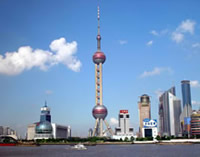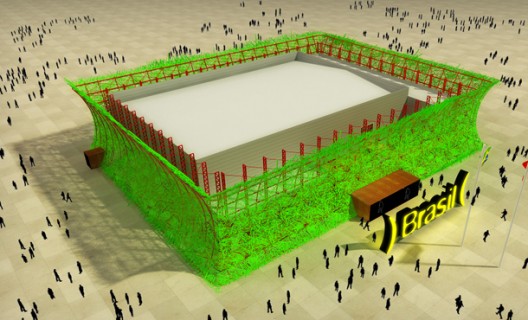|
|


ADVERTISEMENT
Buy Your own advertising
spaces!
.
Download Adobe Acrobat Reader to open [PDF] files.
Recent Visitors
Soccer surprises in store as Brazil prepares for kick-off
2009. 14 September
 by Yang Jian
by Yang Jian
(shanghaidaily.com)
The National Stadium, better known as the "Bird's Nest," amazed the world at the 2008 Beijing Olympics. At next year's World Expo Shanghai, a very similar bird's nest will be standing along the Huangpu River.
Although smaller in comparison to the 258,000-square-meter Olympic venue, the nest at the Expo will be no less fancy and may offer more surprises for visitors.
This is the Brazil Pavilion for the World Expo Shanghai.
The Brazilian Expo team unveiled its pavilion design to the Expo organizer on September 7.
The South American country will decorate its pavilion for the World Expo Shanghai like a green "bird's nest."
The rectangular pavilion will be covered by green intersecting wooden strips, in a manner similar to the National Stadium.
Although the country will be renting a pavilion from the organizer, its US$35 million budget is no less than some stand-alone pavilions.
The 2,000-square-meter pavilion is also the largest rented pavilion at the 2010 event.
The biggest highlight and surprise at the pavilion will be the news that the Brazilian football star Kaka may appear in the pavilion to pose with his fans from across the world.
Other famous players such as Ronaldinho and Luis Fabiano may also attend the event.
The Brazilian Expo team will decide the final list of who will be in Shanghai according to the players' performances at the finals of the 2010 World Cup in South Africa that is being held from June 11 to July 11, said Alessandro Teixeira, chairman of Brazilian Trade and Investment Promotion Agency and commissioner general of Brazil for the Expo.
Brazil has just booked its place in the World Cup finals by winning their qualifier against Argentina 3-1 in Rosario.
Some of the games involving the Brazil side at the World Cup may be broadcast live on some screens at the pavilion.
The players who will make the trip to China are expected to pose and chat with the visitors to the pavilion, but the pavilion may be too small for them to show off their football skills.
However, football will be involved in every part of the pavilion's exhibition and will be especially highlighted in a section named "Happy Room."
A 180-degree curved screen will display a scene that is full of excited spectators cheering at a football match.
Visitors will stand at the center of the 400-square-meter room and they will feel what it's like to be a football star who has just scored a winning goal for his team.
Another highlight in the pavilion is the tunnel of daily urban scenes.
A total of 192 LCD screens of various sizes will be positioned as a large curved panel on the walls of the tunnel to display city scenes.
A hall, called "Pulsing City," spanning 400 square meters, deals with the central theme of the pavilion.
Four screens measuring 12 meters long by 4 meters wide will be suspended 1.5 meters above the ground. They will display random images of the country's different regions.
An environment of sensorial stimuli will provide the visitors with the sensation of being in a Brazilian urban setting, to feel such an area's dynamism and vitality.
Images on the floor will show the texture of sidewalks of Copacabana and the sands of Brazilian beaches.
The pavilion will also highlight the cultural diversity of Brazilian cities, their dynamism as well as its football themed on "Pulsing Cities: Feel the Life of Brazilian Cities."
Brazil is a dynamic country because of its music, dance and sports.
Its cities are alive like a heart that is pulsing rhythmically, Teixeira said.
The pavilion will highlight the transformation of Brazilian cities in search of urban solutions that result in sustainable development and wellbeing for their citizens.
Brazil has large cities and a large population.
It has the same social problems as China in housing, public transport, environment and sewage.
The country will share experiences with China and the world on how to solve these problems.


